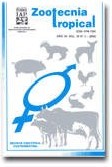
|
Zootecnia Tropical
Instituto Nacional de Investigaciones Agrícolas Venezuela
ISSN: 0798-7269
Vol. 21, No. 3, 2002, pp. 301-323
|
 Bioline Code: zt03020
Bioline Code: zt03020
Full paper language: Spanish
Document type: Research Article
Document available free of charge
|
|
|
Zootecnia Tropical, Vol. 21, No. 3, 2002, pp. 301-323
| es |
Caracterización estructural y funcional de fincas ganaderas de doble propósito en el municipio Páez del estado apure, Venezuela
Luis Páez, Tiburcio Linares, Willian Sayago y Rafael Pacheco
Resumen
Con la finalidad de Evaluar las características estructurales y funcionales de fincas de ganadería de doble propósito en el municipio Páez del estado Apure se realizó un diagnóstico rápido en 29 fincas que conforman la red de investigación y transferencia del convenio de Cooperación Tecnológica INIA-PDVSA en esta región. Se utilizó una metodología para la descripción de los aspectos estructurales y el establecimiento de una tipología funcional, aplicando una encuesta contentiva de varios capítulos de información, los cuales se relacionaron con ocho variables discriminantes de los aspectos funcionales de la unidad de producción: las mismas fueron analizadas estadísticamente por el método factorial por correspondencias múltiples, seguido por un análisis de clasificación ascendente jerarquizado para determinar el agrupamiento de las fincas en base a su similitud funcional. Los resultados permitieron evidenciar los rasgos estructurales principales de las fincas, las variables con mayor poder de diferenciación, y finalmente, la clasificación de la muestra en grupos de diferentes niveles tecnológicos. Las variables de mayor importancia en relación con la diferenciación entre las fincas estuvieron asociadas a los aspectos de la gestión u organización técnica de las explotaciones, seguidos por los de la productividad física medida en términos de leche por hectárea, y el manejo de la salud. Una tipología compuesta por tres categorías fue identificada, en donde las fincas de la clase 1 representaron la ganadería de doble propósito tradicional, con bajos niveles de intensificación y poca organización técnica; las de la clase 2, o fincas intermedias, con bajos a intermedios niveles de producción y baja productividad y poca gestión técnica; y la clase 3 representando las explotaciones con el mejor desempeño productivo, mejor organización y una clara definición hacia la intensificación del sistema leche-carne
Palabras-clave
Ganadería, Sistemas doble propósito, Caracterización, Tipologías, Análisis factorial
|
| |
| en |
Structural and functional characterization of dual purpose farms in Páez municipality in Apure state, Venezuela
Luis Páez, Tiburcio Linares, Willian Sayago y Rafael Pacheco
Abstract
To know the structural and functional characteristics of some double purpose cattle farms in Páez municipality in Apure state, Venezuela it was carried out a rapid diagnostic study in 29 farms that comprises the network for technological cooperation between INIA and PDVSA for researching and transference. A methodology that describes the structural aspects and the establishment of a functional typology was used based on a survey, where 8 variables which allow discriminate on the functional aspects of the production unit were used. These aspects were analyzed statistically by the factorial method for multiple correspondences, followed by a nested analysis of upward classification to determine the clusters by the farms, accordingly to their functional similarities. The results revealed the main features of these farms, and those variables with higher differentiation power, and the classification of the sample based on in their different technology level groups. The variables of more importance, in connection with the variability of the properties, were associated to aspects, such as administration or technical organization of the farm, followed by the physical productivity, as milk for hectare, and the management of the cattle health. Three farm typology were identified: class 1, that encompasses the traditional double purpose management system, with low technological level and scarce organization, class 2 or intermediate, with low or intermediate production levels, low productivity and little technical administration, and class 3, represented by those farms with the best productive performance and organization and a clear definition of the intensification toward of the milk-meat production system.
Keywords
characterization, typologies, dual purpose, factorial analysis
|
| |
© Copyright 2003 - Zootecnia Tropical.
Alternative site location: http://www.sian.inia.gob.ve/repositorio/revistas_ci/ZootecniaTropical/ztindice.htm
|
|
